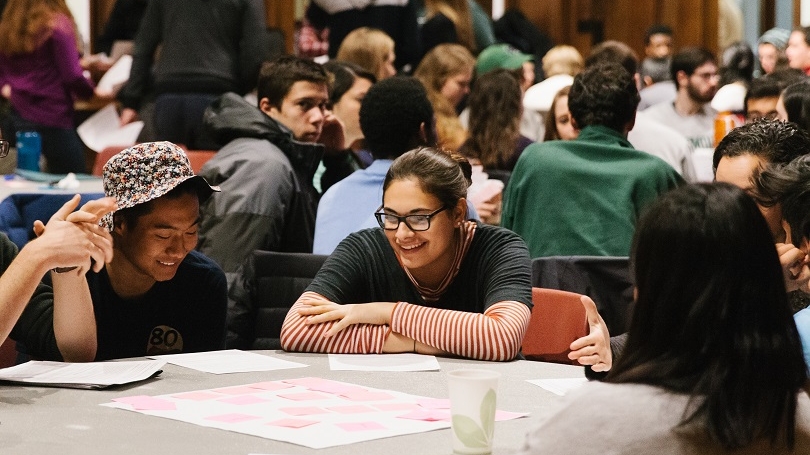
- Public Policy
- Leadership
- Funding
- News & Events
- About the Center
Back to Top Nav
Back to Top Nav
Back to Top Nav
Back to Top Nav
Prior to the fourth session of D-LAB, participants were asked to rank the top ten values they believed to be the most important to Dartmouth, as well as the values they believed were perceived as important to the College from an outsider perspective. At the beginning of the session participants in groups wrote the top five values that they personally believed to be the most important to the College on Post-It notes, which were then placed on a large poster board. Participants were asked to group the Post-Its by similarity; values that had been chosen the most included knowledge, community, and tradition.
After grouping values, facilitators asked the participants why they chose these certain values, especially the ones that appeared the most on the board. Participants’ answers included the College’s reputation as an academic institution, its social atmosphere, and the goals of the administration. Participants were also asked what values were not represented on the board that they felt should have been included. Answers included values such as appearance and health, which group members felt were important to the community but rarely discussed. Participants also discussed how they felt they could reflect certain values that were either on or off the board at the College during their time as students. Participating in not only community activities but planning such events, as well as creating an inclusive atmosphere, were some things students felt that they could do in order to uphold such values as community.
Participants were then given the Dartmouth Mission Statement which outlined the values that the administration believed to be important to the College. The group split into pairs to discuss the statement and how they felt these values were apparent on campus from both students, faculty, and the administration. Participants also discussed how the values given in the mission statement related to the values that they had personally perceived during their time at Dartmouth, and were asked if they felt their own personally selected values were reflected in the mission statement. The conversation about the similarities and the disparities included the clash of tradition and modern social values and the idea of dialogue on campus. Some students said that they felt dialogue was limited on campus due to the difference between majority and minority views. The conversation led to the discussion of how the participants could act individually to uphold values that they saw as positive for the College and their peers, while assigning responsibility for the implementation of the values through both official programs by the administration and the social atmosphere by students.
Participants also discussed the idea of integrity at Dartmouth when they were asked what the word meant in context of the institution. The conversation included examples such as the Academic Honor Code and whether students felt the Code was sufficiently upheld by themselves and their peers. The group also discussed how to represent the institution to people outside the College in a manner that held integrity.
Director of Religious and Spiritual Life Rev. Nancy Vogele ‘85 was the keynote speaker after group discussions. Her talk included such points as knowing one’s values as well as the values of the institution that the individual decided to join. She said that one could not agree with everything that institution stood for, but it was important to join one that was at least strong in the values that one held most important. She also emphasized the importance of challenging the institution’s weakness in certain values instead of simply giving up. She quoted Dr. Martin Luther King Jr. as an example of this challenge; his Civil Rights Movement had prompted the country that he loved to be more and to be better.
Submitted by Joyce Yegene Lee '19, D-LAB participant